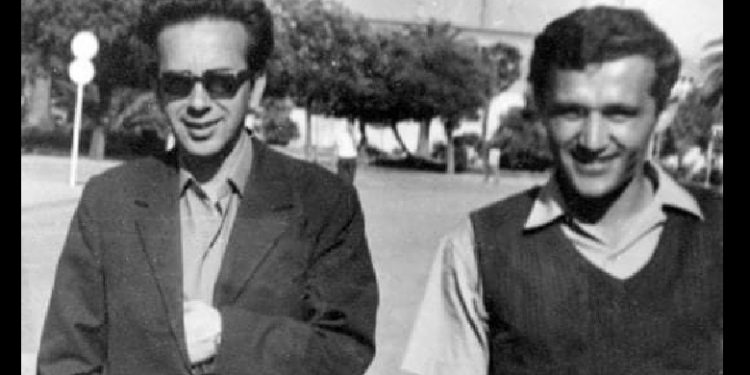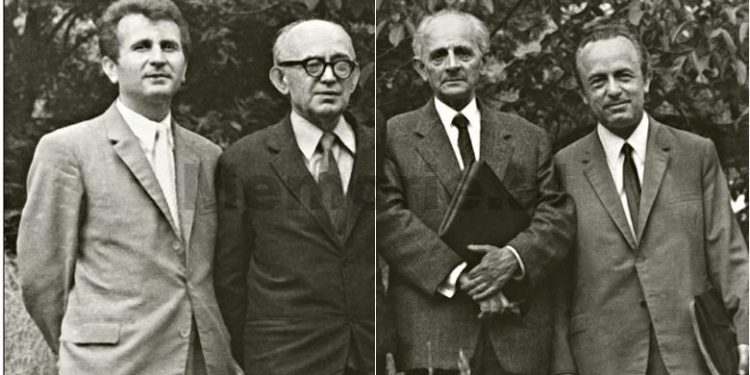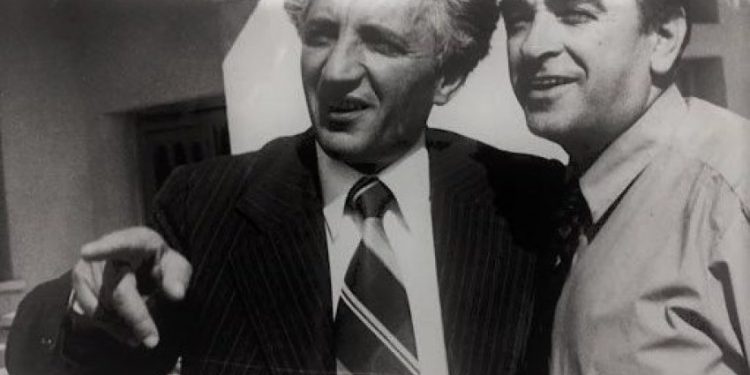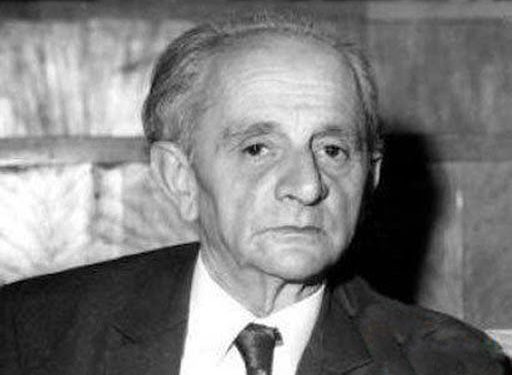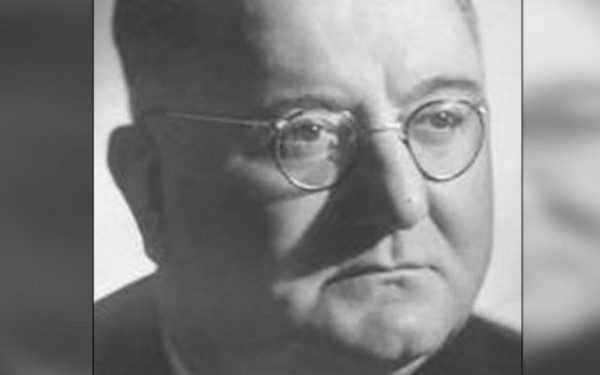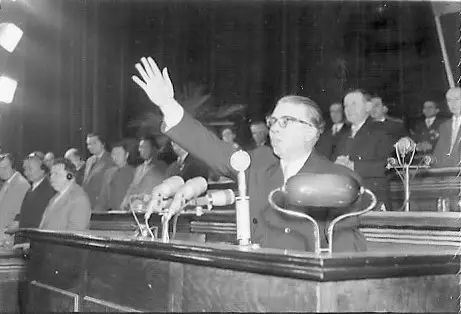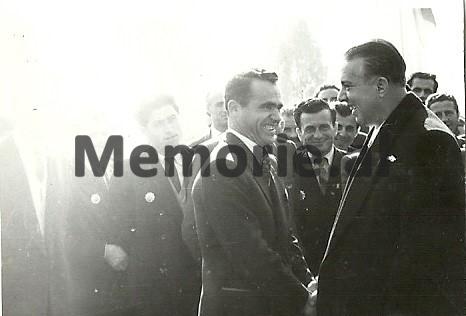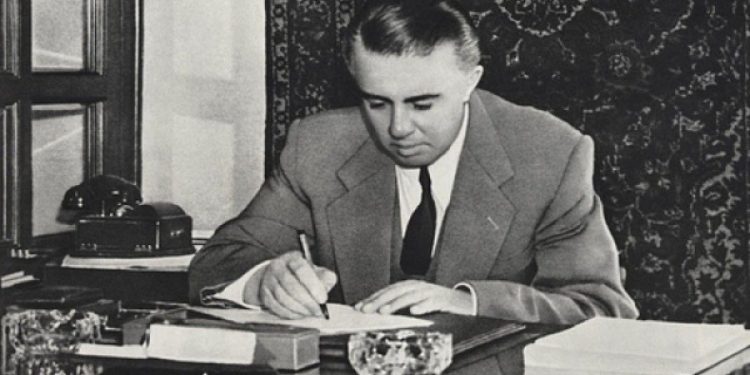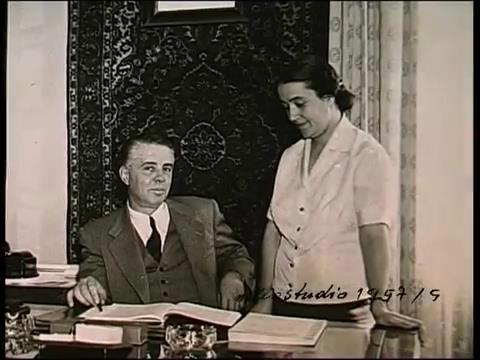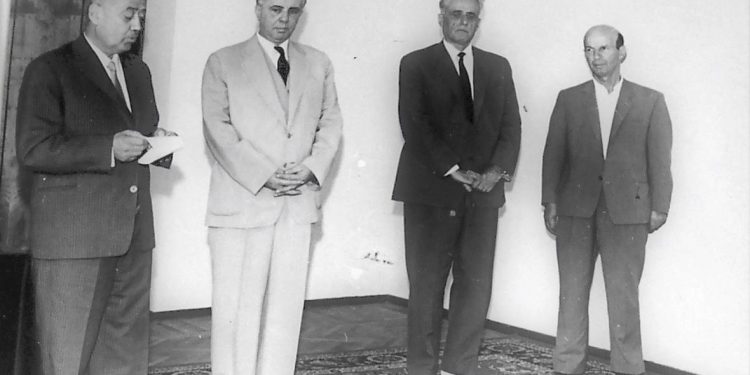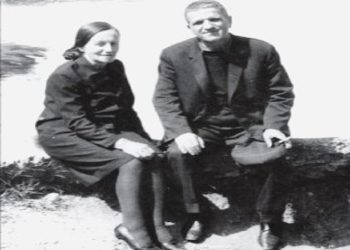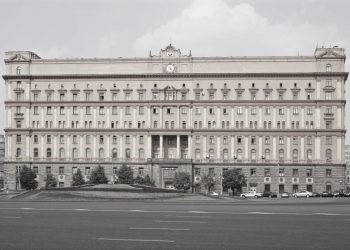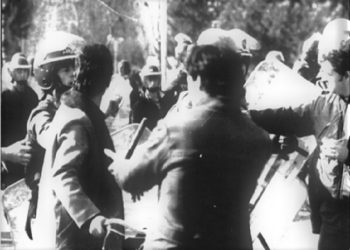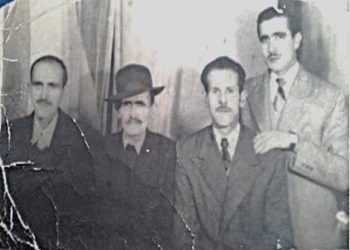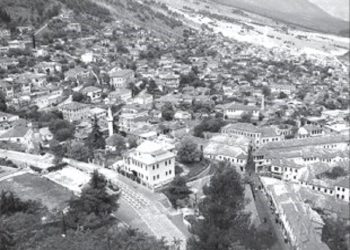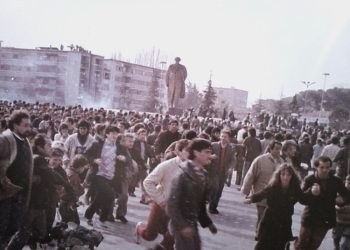Dashnor Kaloçi
Memorie.al publishes an archival document issued by the Central State Archive in Tirana (fund of the former Central Committee of the ALP) where the discussion of Enver Hoxha held on July 11, 1961 in a meeting with writers and artists, otherwise known as the meeting where he spoke for the first time about the contradictions that existed at that time between Albanian writers who were divided into two groups, considered as “old and young”! Enver’s discussion in that meeting where he after talking about the tradition and cultural heritage of our people, mentioned the famous architects: Skënder Luarasi, Anton Lufi and Eqrem Dobi, appreciating those projects with exquisite artistic taste that they had realized, as descendants of Architect Sinan and Karl Gega, the designer of the Semering mountain railway, also spoke to the writers, talking about Andrea Varfin from the “group of the old” and Ismail Kadare, from the “group of the young”, whose poems like her “Princess Argjiro”, etc., they liked very much. Enver’s speech about the former friend of his youth, Eqerem Çabej, for whom he said that he had given his hand after 30 years, as he “had not betrayed like Ernest Koliqi” and the event with the well-known intellectual and not weak character “, who after suffering several years in political prisons, when he was released, had written a letter to the leadership” about the great changes that the Party had made “asking to be published, but his name he said that … ?!
“A person with a broad culture and not a weak character, for the crimes he had committed during the fascist occupation, was sentenced to prison. After serving his sentence, he was released, and traveled by bus to all four corners of the country, where he saw new cities, factories, hydropower plants, roads, canals, fields and more. After that, he addressed a letter to the Central Committee of the Party, where he wrote that “now that I was released, I walked around the country, I saw all the miracles that have been done by our people during the years after liberation. A big change happened to me, a transformation took place in my views and I am convinced that, if we had the power in our hands, we would never have done such deeds. “To achieve these results, a great and smart force was needed to lead the people.” In the letter he wrote many other things and, concluding, begs the Party for his letter to be published. “There will be people,” he says, “who will say, ‘Look, I also lowered my back, but I will tell them that, in the end, I bow to my people, my brothers, the Albanian communists, under in whose direction these wonderful things arose, which we could never do ”. This is not a simple man, but his name… ”?!
This is what Enver Hoxha said, among other things, in the meeting held on July 11, 1961 with writers and artists, otherwise known as the meeting where he spoke for the first time about the contradictions that existed at that time between them, who were divided into two groups. , “Old” and “young”, where he spoke at length, initially talking about the cultural and artistic heritage of our people where he mentioned architect Sinan and Karl Gega who had designed the Semering mountain railway in Austria, praised the projects implemented with fine artistic taste of the architects Skënder Luarasi, Anton Lufi and Eqerem Dobi, also stopped at his former youth friend, Eqerem Çabej, about whom he said that “I shook his hand after 30 years, even though he was no longer us, but he did not betray like Ernest Koliqi ”.”, to close his speech with the discussion of the writers Andrea Varfi and Ismail Kadare, whose poems, like “Princess Argjiro”, he liked very much. Regarding this and others from the speech of the communist dictator of Albania held in July of ’61, we will be known in this article that Memorie.al publishes for the first time and with some cuts, removing the propaganda parts.
Enver Hoxha’s speech at the meeting with writers and artists July 11, 1961
Dear friends, it is a pleasure for me to attend this meeting and I can say that I have benefited greatly from your generally fair, fervent discussions, permeated by a high patriotic spirit and a boundless love for the people. And our dear Labor Party. On this occasion, fellow writers and artists, I would like to convey to you the cordial greetings of the Central Committee of the Party and assure you that the Party and its leadership, in the future, will take care of the development of culture in general and in particular for the development of literature and arts in our country. You have felt this natural, necessary care of the Party in your life. You, the writers and artists, together with the Party, have gone through and felt all the sufferings, sacrifices and joys of our people. During all these years in your work you have been helped ideologically and professionally with all the forces and opportunities that have existed. On the material side, aid has been increasing and improving. You, as members of this people, as comrades on the same front with the working class and the peasantry, have noticed that the fulfillment of your material needs has gradually progressed, in addition to improving the lives of the people.
The latest decision of the Central Committee of the Party was taken in order to give an even greater impetus to the development of literature and arts in our country. This decision, as they have reported to us, as we have read in the press and as we are noticing here from your discussions, has been well received by you. You have agreed with this decision and found it necessary to be guided by it in your creative work. This is a very good thing, which shows, in addition to the countless other proofs you have given, that you are worthy sons of this people, proves once again that our intellectuals, writers and artists, in good moments and difficult, walk firmly on the path of Marxism-Leninism, remain loyal to the Party and the high interests of our people and socialism.
- Our literature and arts have developed in the right way what do the Party and its leadership think about the development of arts and literature in our country during these 17 years of post-liberation? I can say, in a nutshell, that the view of the Party and its leadership is that the development of literature and the arts in our country has been rapid in all areas. This rapid and straightforward development, in such a short time, without drawing any boastful conclusions, testifies to your creative power and talent, of the people of art and literature, as well as of the vitality and creative talent of our people. Our people of literature and arts are as simple as our own people. But we must say that your works, your creativity, whether in literature, music, painting, sculpture, or in the performing arts, honor you and all the people, both at home and abroad. This is a great success, because, let’s not forget, in Albania, during the anti-popular regimes, unlike what happened in other countries, the opportunities for the development of literature and arts have been very limited, due to the negative attitude. And the backbone of the country bourgeoisie to the literature of the arts and the extremely meager means at their service.
- Our people have inherited a great culture with progressive traditions. You, comrades, are employees of the cultural front and you know very well that throughout history many peoples, even great ones, with ancient civilization, have disappeared, while our people have resisted, has not disappeared. Our people have not disappeared over the centuries, because they have been a brave people, a people who over the centuries have fought to defend themselves, to gain and preserve their freedom, independence, language and culture. Despite the fact that our culture has not had such a development, as some other peoples have had, our people, one of the oldest peoples, has not been without culture. It is impossible for a people without culture to overcome difficulties as great as those that our people have overcome over the centuries, difficulties that threatened its extinction.
The churches, though not with the splendor of Byzantine monuments, the iconographic works that were left in oblivion in the past represent a part of the past culture of our ancestors and we these works of art must preserve, collect, regardless that they have a religious character, they today for us have the value of an invaluable artistic treasure. Now in our country large-scale archaeological research is being done, among which we find treasures that show that our people have not been an ignorant and uncultured people, but a people with culture and a high artistic taste. The time will come when our museums will be filled with such works, which will be a rich and invaluable heritage of the past culture of our people, but for this we need to study even more the glorious past of his, because there we find expressed all his life, joys, sufferings, his artistic taste, the struggles for freedom and independence, the tendencies and customs that our people have inherited from generation to generation until today. What does this art and this ancient culture of our people show? They show a special characteristic of him, his struggle and determination on the issue of defending his homeland, his land, his life and his customs.
I think even in the fine arts we have a rich heritage. Figurative and applied arts, although not as we have them today, existed even in the darkest times, when our country was occupied by Turkey. The women of our country, the Albanian craftsmen embroidered on fabrics, in watermarks, carved in stone and wood such beautiful artistic things that they occupy a prominent place in the richness of our folk art. Therefore, even in the field of fine arts, which we consider very new, we have had traditions and it would not be fair to say that we lack traditions in this field. We also have traditions in the field of architecture, which, as we know, is part of the field of art. It is true that the paintings and sculptures of our painters and sculptors are beautiful works of art, but also a palace or a house of culture, built with high artistic taste, like those designed by our talented architects, such as Skënder Luarasi , Anton Lufi, Eqrem Dobi and others, are works of art, even there the subtle artistic taste can be seen, even on the stone there is indelibly the artistic taste of a people. From the bosom of our people has emerged the architect Sinani, a prominent man, whose name is mentioned in every book of world literature on the history of architecture. Many know that the famous Semering tunnel in the middle of the Alps was designed by the prominent Albanian architect Gega. The memory of the author of this work, who required great wit and skill, is immortalized in a bas-relief placed at the entrance of the tunnel.
- Patriotism is the red thread that permeates all the aspirations, efforts and creativity of our people and its distinguished people in every field. The ardent spirit of patriotism has led the Albanian renaissance who has done such beautiful and inspiring works. The Renaissance in their creativity, were guided by ardent patriotism, by great love for the homeland and for the people. The great inspiration of the renaissance, their pure patriotism, the ardent love for the homeland and the perspectives that opened with their works to the Albanian people, should inspire our writers and artists in their creativity. Despite the fact that in the works of the Renaissance there are also different philosophical views of those times, with which sometimes we do not agree, they remained ours and young forever. Naim Frashëri remains Naim, our greatest poet who is adored by all, because he sang with great pathos to the beauty of the homeland, melted like a candle for freedom, for the Albanian language, dreamed, worked and fought for the future of the people which was made a reality by the Labor Party of Albania with popular power. And just like Naimi, many, many other writers and poets have sung to our people and homeland with great love. It is well known that usually great peoples and creative talents show themselves more than ever in important turning points. This is what happened to us. These wonderful works of our writers and artists have emerged in turning points in the life of our people, in revolutionary periods.
In our country, constructions are taking place at an unprecedented pace, cities are expanding and giving birth, the peasants are building new houses almost en masse; a new industry of textiles, carpets, ceramics, glass, wood, etc. is developing, or rather. All those state-social bodies that are interested in meeting the needs of employees are now thinking and working on all this. But we will become “remorseful,” as the saying goes, and future generations will criticize us if we do not think and work to make what we build and produce not just to meet immediate needs, yes to satisfy and taste not only the present but also the future generations. The time has come for design bodies, for example, to be guided in their plans not only by financial quotas and certain technical norms, but by relying on them, to organize as much consultation as possible between themselves and with researchers and people of creativity, with artistic performers, even with the employees themselves, intellectuals, women, young people, etc., so that our constructions, cities, villages, dwellings, socio-cultural institutions, parks, etc. to be as beautiful as possible, to satisfy and educate the artistic taste of our people and future generations to see in them the talent of the creative work of architects, engineers, masters and generally the people of artistic creativity of our time.
The unity of writers and artists with the cause of the people and the Party is unbreakable Comrades, a discussant said here that this is such a meeting that, if there were a stranger among us, he would think it is a party meeting. And indeed it is. It is difficult for us to distinguish who has and who does not have the Party card. This is because we, the Party and the people, not only liberated the homeland and are building socialism, but also created a steely moral-political unity of our people, which cannot be achieved either by propaganda or words, but only by works. It is the great deeds created by the people, under the leadership of the Party and thanks to its straight line that ensured this unbreakable unity between the Party and the people. It is the maturity of our Party, which made big and small in Albania, especially when they see on the horizon any danger, no matter how small, put aside any anger, rage, opposite views and, as our ancestors did, unite strongly like a fist.
- The Party has had great patience with the people. After 30 or 35 years I gave my hand to an old friend of mine, Eqrem Çabej. I have not had the opportunity to do this before. Eqremi took on a German culture when he was young and took his own path in life as he judged it, a path different from ours. It is a fact that he did not lie in line with us, but he did not commit crimes and, when the homeland was liberated, he did not take the mud of the homeland in the hooves of shoes, as Ernest Koliqi did; Eqremi did not betray like him. It was quite easy for us to take measures against him, but the Party did not do that, on the contrary, it helped Eqrem Çabej to continue his scientific work, to help the school and the training of the cadres and thus to serve the people of the homeland. Eqrem Çabej is a scientist, a man of wide culture. He is seeing what is happening in our country, how the Party has changed and is constantly changing the face of our country. I am convinced, based on the knowledge I have of him, that he is pleased to see that along with him new valuable people have been raised, new scientific staff in the field for which he has worked and with whom he can discuss. I am also convinced that if he delves deeper into the study of the great science of Marxism-Leninism, it will be easier for him to orient himself in solving the problems of the science of linguistics. I can bring another example, of a man of another category, to show the justice of the Party line, which not only made the people one and inseparable around it, but also made many of our opponents change their views. Theirs.
A person of broad culture and not of a weak character, for the crimes he had committed during the fascist occupation, was sentenced to imprisonment. After serving his sentence, he was released, and traveled by bus to all four corners of the country, where he saw new cities, factories, hydropower plants, roads, canals, fields and more. After that, he addressed a letter to the Central Committee of the Party, where he wrote that “now that I was released, I walked around the country, I saw all the miracles that have been done by our people during the years after liberation. A big change happened to me, a transformation took place in my views and I am convinced that, if we had the power in our hands, we would never have done such deeds. “To achieve these results, a great and smart force was needed to lead the people.” In the letter he wrote many other things and, concluding, begs the Party for his letter to be published. “There will be people,” he says, “who will say, ‘Look, I also lowered my back, but I will tell them that, in the end, I bow to my people, my brothers, the Albanian communists, under in whose direction these wonderful things arose, which we could never do ”. This is not a simple man, but I will not tell you his name. We did not publish his letter either, because the Party made this man, who was justly condemned by the laws of the Party and the state, a young man and he will defend him, because we want no one to offend him now that he is really entering in a new life. The policy pursued by the Party, up to those people who have been released from prison, is a just policy, which has closely linked it to the people. This policy has led the people to unanimously approve the punishment of all those who betray the interests of the homeland, whether with party or without party. The straight line of the Party, its consistency and heroism, have constantly influenced and still influence the views of those people who did not understand and did not love the Party.
- Literature and the arts, moving forward on the right path, are getting richer every day. There are many contradictions in life, which you need to discover and show the way to solve them. The report delivered at this meeting by Comrade Ramiz Alia should be considered as something that complements the decision of the Central Committee of the Party on literature and arts. Comrade Ramiz does not claim that it will solve all the problems of our literature and arts, but it gives way to some of the main issues that are a problem for you. You may even have your own remarks, your own views on something that probably needs to be corrected even further; make them for us to fix, because the Party thinks that the most valuable thing is what comes from the experience of the people. You also have your own bodies to go to, but you can also go to the Central Committee on a specific issue. The party will always welcome your remarks and suggestions. As noted during the discussions, our lives are a great source of inspiration. What greatness is being created in our country, we are living it ourselves. There is poetry everywhere, there is innovation everywhere and no one has the right and cannot prevent it. It is just that this innovation must go on the right path, respecting the principles of socialist realism; the work must be simple, clear, magnificent, mobilizing, educating and opening the people to perspective. This is of great importance and we find it everywhere. Understand innovation as the innovative worker understands it. If the innovative worker or technician seeks to improve the lathe, the machine, the airplane and is not based on science, technique, its traditions, then there can be no technical-scientific progress. Therefore, no one has the right to hinder innovation, but at the same time the good traditions of the past should not be rejected.
Innovation should never be equated with the denial of tradition. You have to show great care for the interior. It is very important that the work comes out beautiful, clear, understandable, but it must also have a sound, educational brand, be clear and useful to the masses. Comrade Andrea Varfi, when discussing, stressed that he likes the quatrain. I also like the octave in poetry, I also like the octave, and when I heard Comrade Andrea’s discussion I said at the break that I agree with his point of view. Then Andrea turned to her friends and said jokingly, “Speak now if you want.” But in fact he was wrong and the truth is that friends came out and spoke, discussed and ardently defended opposing views. And that’s a very good thing. When I heard the discussions of some friends, to be honest, except for one thing I did not like that it turned out that the issue is “young” and “old”. In fact, some of you are young, some are old, but I think that the issue of “young” and “old” is not a problem for us. Young people with their dynamism and liveliness do well to shake us older ones. We should be grateful to them for that. The dynamism of the new comrades is a great treasure for the Party and for our people. You, young friends, should know that even older friends have gone through these stages that you are going through now. That is why I never believe that the older writers and artists want to hinder the creativity of the younger ones, but they, having passed through these paths before, are afraid that from the big rush you will slip out of the way.
But I am convinced. that you, young friends, will never go astray, that our young and old writers and artists will never stray from the great path, the method of socialist realism, on the basis of which they were created, in the Soviet Union in the first place, and in the countries of popular democracies, such literary and artistic works that have become an integral part of the world’s best literary and artistic heritage. I have read some poems by Ismail Kadare. I read, for example, what he dedicated to Gjirokastra Castle, “Princess Argjiro”, which I liked, probably because I am from Gjirokastra. I have also read other poems by Kadare, which I have liked and I have the impression that he is a talented young man. I’m sorry I do not remember the poems of some friends I knew and heard here. Your discussions in this meeting push me to assure you that from now on I will read your works even more carefully, because as a communist I want with all my heart to see how the youth moves forward, creates beautiful works for the people, for that people she loves with so much fire, patriotism and boyish spirit that she will never grow old. I think it is a good thing to discuss among yourself the problems that come before you, because from social discussions always comes something new, good. The most experienced friends have a great advantage, they are older and it is known that in old age “even vinegar does not look so strong”.
Comrades Andrea Varfi, Llazar Siliqi or others in this category are not angry with the discussions that took place here by some friends. They are communists, they are older in age, they are among our best poets, so young poets can and should discuss extensively with them. But I wanted to tell both old and young that, if they are going to make poems that resemble those of bourgeois decadents, that would be really disgusting, such poems are to be thrown away. Down because they hinder the development of our poetry and badly educate the masses. But from what I know and from what I understood from your discussions, so far in literary and artistic creativity there has been nothing wrong. If there are some bad poems, you friends with a more affirmed talent, do not reserve criticism against them, otherwise you would make a big mistake.
Also, even the youngest would hold a wrong attitude if they did not listen to the criticisms of older and more experienced friends. But criticism must be constructive, real, and social. Some of the friends who discussed also used some words that made some others bitter. For example, one managed to say in his discussion that in the poems of some young poets, there is nothing national.
Of course, the young author has no way of bearing this criticism. The young comrades therefore sought facts to argue where their poems are not national, and, as the facts did not come out, they inserted some fine needles, calling the old comrades conservatives, blocking the way for the young. My personal opinion is that as long as your poems have Marxist content, truly patriotic, mobilizing, educational and beautiful, attractive, clear form, they should not be disliked. Comrade Ramiz Alia said it well in his speech: Affirm yourself with your verse and if the people love you, that verse is good. If a deed is accepted by the people, liked by it, then it is okay. Whether he makes the poem with eight, ten or twelve syllables, free verse or rhyme, it depends on the author. There may be writers and artists who, when they create, think about how this or that writer or artist will expect their creation. This is one. good thing because it shows that they have respect for others, for those who have a great creative experience. But really, in the first place, he has to think about what the people mean, what the working class and the peasantry mean, how the general public will expect his work. This is of great importance. If he has done a good deed, then literary or artistic criticism will definitely welcome him. Memorie.al




